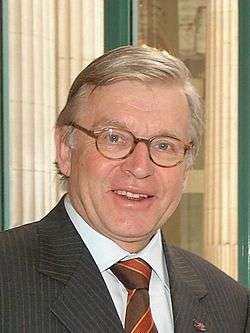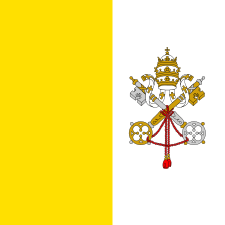René van der Linden

Pierre René Hubert Marie van der Linden (born 14 December 1943 in Eys) is a Dutch politician. Van der Linden was member of the House of Representatives from 8 June 1977 to 14 July 1986 and once more from 29 November 1988 to 19 May 1998.[1] Between his terms in the House he served as State Secretary for Foreign Affairs. He was member of the Senate of the Netherlands between 8 June 1999 and 9 June 2015. He was President of the Dutch Senate from 2009 to 2011, and President of the Parliamentary Assembly of the Council of Europe from 2005 to 2008.[1]
Education
Economics: international administrative studies at Catholic Economics Faculty in Tilburg, (1966–1970), (now known as Tilburg University)
Career
- Member of the First Chamber (Senate) of the States-General of the Netherlands (1999–2015)
- President of the First Chamber (Senate) of the States-General of the Netherlands (from 2009 until 2011)
- President of the Committee for European cooperation of the First Chamber of the States-General (from 2002 to 2009)
- Member of the Second Chamber of the States-General of the Netherlands (1977–1986 and 1988–1998)
Secretary of State for Foreign Affairs with responsibility for European Affairs (1986–1988)
- Member of the cabinet of European Commissioner Pierre Lardinois (1973–1977) and European Commissioner Henk Vredeling (1977)
- Civil servant, Ministry of Agriculture and Fisheries of the Netherlands (1971–1973)
- Teacher of economics (1969)
Other posts currently held
- Council of Europe Parliamentary Assembly (PACE) member (since 1989)
- Member of the Parliamentary Assembly of the Western European Union (WEU)
- Member of the executive board of the Dutch employers’ confederation
- Board member of Kerk en Nood (Church and Need)
- Chairman of the Maastricht School of Management (since 1999)
- Board member of several associations in the agricultural sector
Party political posts
Chairperson of EPP/CD group in the Council of Europe Parliamentary Assembly (PACE) (1999–2005) and vice-chairperson (1989–1999) Second vice-chairperson of the Christian Democratic political group, CDA, Second Chamber of the States-General of the Netherlands (1982–1986) Member of the party executive of the CDA Member of the party executive of the former Catholic Popular Party, (KVP), and vice-chairman of the KVP youth section
Other posts previously held
- President of the Parliamentary Assembly of the Council of Europe (2005–2008)
- Chairperson of the Netherlands delegation to PACE (2003–2005)
- Delegated representative of the First Chamber of the States-General of the Netherlands to the Convention on the Future of the European Union
- Patron of Stichting Lisboa, homeless children in Portugal (1995)
- Chairman of the advisory committee of the national school of translators and interpreters, Rijkshogeschool Opleiding tolk-vertaler (1990)
- Adviser to Combined Chambers of Commerce in Limburg (1989 and 1992)
- Member of Consultative Interparliamentary Benelux Council (1977–1986)
- Board member of the Netherlands Organisation for international assistance, NOVIB,
- President of several cultural foundations
Van der Linden was secretary of state of foreign affairs in the Dutch cabinet Lubbers II. He was responsible for the passport fiasco which was caused by ministerial incompetence (Dutch: paspoortaffaire).
Controversies
Controversial claims about citizenship issues in Baltic Countries
During a press conference in Tallinn on 19 September 2007, a controversy ensued when Linden accused Estonia of not permitting non-citizen residents to take part in local elections.[2] Former Prime Minister of Estonia Mart Laar attempted to correct him, pointing out that all permanent residents in Estonia have the right to vote (but not to be elected) in local elections. However van der Linden referred to reports of the Amnesty International and other human rights organizations.
In reaction, the Estonian Social Democratic Party issued a statement calling that van der Linden be immediately dismissed from his post. Admitting that Linden's term of office is due to end in late 2007 anyway, the statement declared that he had with his inaccurate comments disqualified himself.[3][4]
On 2 October 2007, speaker of Estonian Parliament, Ene Ergma, sent a strongly worded open letter to van der Linden, asking him to do his homework and "give up spreading erroneous information about Estonia", which "created confusion and bewilderment both in the Estonian public and internationally."[5] In his reply, van der Linden expressed amazement at the content of the letter and the fact that Ene Ergma made accusations public before giving him any right of reply. He also pointed out that Ene Ergma never expressed such views to him during their meeting, which took place less than two weeks before.[6]
Later that month, in a press conference in Lithuania, he claimed that millions of people live without status in the Baltic countries.[7][8] The population of Estonia is roughly 1,342,000, of which roughly 8.5% are without defined citizenship.
Alleged financial interest in Russia
In August 2007, van der Linden became embroiled in controversy after articles in the Eesti Päevaleht suggested that van der Linden's family had business interests in Russia.[9][10] This is suspected to explain his lack of criticism towards Putin and the Russian government for human rights violations and his pro-Russia and anti-Baltic stand,[11] as well as his stand against relocating the Bronze Soldier of Tallinn from central Tallinn.
After a 3 October 2007 phone call from van der Linden, threatening investigation by French police, Marko Mihkelson, chairman of the Estonian parliament's European Union affairs committee, held a press conference on 8 October 2007 where he presented materials collected from various publicly available Russian media sources in which central topic is van der Linden's role as the head of the supervisory council of a certain Dutch investment company that established the biggest industrial park in Europe in Sobinsk, Russia in late 2006.[12] Subsequently van der Linden denied all accusations and stated that he never had any financial interest in Russia neither is he serving as mentioned chairman.[13] He was called the head of the supervisory board of Noble House Group at the home page of the Dutch investment company Noble House Trading.[14] However, a representative of Noble House Holding told Estonia's ETV, on 7 October 2007, that van der Linden is not a member of the company's supervisory board and that the supervisory board would be appointed only next year.[15]
Honours and awards
Dutch honours
-
 Netherlands: Knight of the Order of Orange-Nassau of the Netherlands (18 May 1998)
Netherlands: Knight of the Order of Orange-Nassau of the Netherlands (18 May 1998) -
 Netherlands: Knight of the Order of the Netherlands Lion (21 December 1988)
Netherlands: Knight of the Order of the Netherlands Lion (21 December 1988)
Foreign honours
-
.svg.png) Belgium: Officer of the Order of Leopold II of Belgium (21 January 2011)
Belgium: Officer of the Order of Leopold II of Belgium (21 January 2011) -
 France: Commander of the Legion of Honour of France (November 2007)
France: Commander of the Legion of Honour of France (November 2007) -
 Germany: Commander's Cross of the Order of Merit of the Federal Republic of Germany (2004)
Germany: Commander's Cross of the Order of Merit of the Federal Republic of Germany (2004) -
 Holy See: Knight of the Order of St. Gregory the Great of the Holy See (20 October 2003)
Holy See: Knight of the Order of St. Gregory the Great of the Holy See (20 October 2003) -
 Philippines: Congressional Medal of Achievement of the Philippines (2005)
Philippines: Congressional Medal of Achievement of the Philippines (2005) -
 San Marino: Knight Grand Cross of the Order of San Marino (2006)
San Marino: Knight Grand Cross of the Order of San Marino (2006) -
 Turkey: Order of the Republic (2013)[16]
Turkey: Order of the Republic (2013)[16] - Honorary citizen of Nafplio
- Honorary citizen of Liège
- Honorary President of the Parliamentary Assembly of the Council of Europe
- Friendship Award of Azerbaijan Republic 2013
References
- 1 2 "Drs. P.R.H.M. (René) van der Linden" (in Dutch). Parlement.com. Retrieved 9 June 2015.
- ↑ Reporter (Kanal 2) 19 September 2007: Eesti venelaste ahistamise jutt viis Mart Laari sõnasõtta (Adobe Flash video, English sound, Estonian subtitles)
- ↑ Eesti Päevaleht 1 October 2007: SDE: van der Lindeni peaks maha võtma, edited by Erik Rand
- ↑ Estonian politicians call for resignation of PACE president
- ↑ Estonian lawmakers call for top EU official to be fired
- ↑ Van der Linden strikes back
- ↑ The Baltic Times 2 October 2007: Estonia blasts UN, PACE 'propaganda' and 'lies'
- ↑ Regnum 24 September 2007: PACE president stresses need for equal treatment for all those living in the Baltic states
- ↑ Eesti Päevaleht 3 August 2007: REPLIIK: Kremli käpiknukud
- ↑ http://www.epl.ee/artikkel/400769 Mihkelson: Linden ületas piire
- ↑ Jamestown Foundation 3 August 2007: PACE Chairman Bending to the Kremlin Wind against Estonia by Vladimir Socor
- ↑
- ↑ Rene van der Linden andis Mihkelsonile vastulöögi
- ↑ Noble House
- ↑ Van der Linden controversy re-ignites
- ↑ Precedency of the Republic of Turkey
| Political offices | ||
|---|---|---|
| Preceded by Peter Schieder |
President of the Parliamentary Assembly of the Council of Europe 2005–2008 |
Succeeded by Lluís Maria De Puig |
| Preceded by Yvonne Timmerman-Buck |
President of the Senate of the Netherlands 2009–2011 |
Succeeded by Fred de Graaf |
| ||||||||||||||||||||||||||||||||||||||||||||||||||||||||||